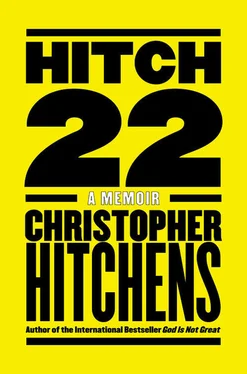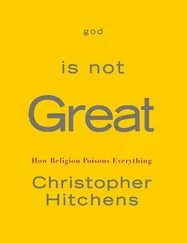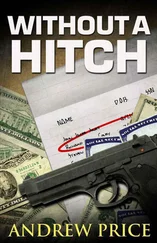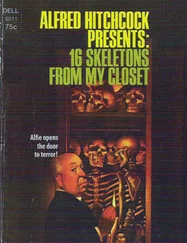Even after all these years I find I can hardly bear to criticize Yvonne, but there was something about which I could and did tease her. She had a slight—actually a definite—weakness for “New Age” and faddish and cultish attractions. When I was a boy it was Gayelord Hauser’s “Look Younger, Live Longer” regimen: a smirking charmer’s catch-penny diet-book that enthralled about half the lower-middle-class women we knew. As time progressed, it was the bogus refulgences of Kahlil Gibran and the sickly tautologies of The Prophet . As I say, she could take some raillery about this from me, at least when it was about unwanted poundage or unreadable verses. But (and this is very often the awful fate of the one who teases) I did not realize how much unhappiness was involved, and I did not remotely appreciate how much damage had been done, until it was far too late. Allow me to relate this to you as it unfolded itself to me.
Going back to Oxford one day, and after I had moved to London and had begun working at the New Statesman , I was striding down the High Street and ran straight into Yvonne just outside The Queen’s College. We embraced at once. As I unclasped her, I noticed a man standing shyly to one side, and evidently carrying her shopping-parcels. We were introduced. I proposed stepping into the Queen’s Lane coffee house. I don’t remember how it went: I was in Oxford to keep some pressing political and sexual engagements that seemed important at the time. The man seemed nice enough, if a bit wispy, and had an engaging grin. He was called Timothy Bryan, which I also remember thinking was a wispy name. I felt no premonition.
But next time I saw her, my mother was very anxious to know what I thought of him. I said, becoming dimly but eventually alert, that he seemed fine. Did I really, really think so? I suddenly understood that I was being asked to approve of something. And it all came out in a rush: Yvonne had met him on a little holiday she’d managed to take in Athens, he seemed to understand her perfectly, he was a poet and a dreamer, she had already decided to break it all to my father “The Commander” and was going to live with Mr. Bryan. The main thing I remember thinking, as the sun angled across our old second-floor family apartment, was “Please don’t tell me that you waited until Peter and I were old enough.” She added, at that moment, with perfect sincerity, that she’d waited until my brother and I were old enough. It was also at about that time—throwing all caution, as they say, to the winds—that she told me she had had an abortion, both before my own birth, and after it. The one after I could bring myself to think of with equanimity, or at least some measure of equanimity, whereas the one before felt a bit too much like a close shave or a near-miss, in respect of moi .
This was the laid-back early 1970s and I had neither the wish nor the ability to be “judgmental.” Yvonne was the only member of my family with whom I could discuss sex and love in any case. I was then informed that she and Timothy had another thing in common. He had once been an ordained minister of the Church of England (at the famous church of St.-Martin-in-the-Fields, off Trafalgar Square, as I later discovered) but had seen through organized religion. Both he and she were now devotees of the Maharishi Mahesh Yogi: the sinister windbag who had brought enlightenment to the Beatles in the summer of love. I had to boggle a bit at this capitulation to such a palpable fraud—“Have you given The Perfect Master any money? Has he given you a secret mantra to intone?”—but when the answer to the second question turned out to be a sincere and shy “yes,” I forgave her in a burst of laughter in which she (with a slight reserve, I thought) nonetheless joined.
It was arranged that Yvonne and the ex-Rev would come to dine with me in London. Feeling more loyal to my mother than disloyal to my father, I took the happy couple to my favorite Bengali restaurant, The Ganges in Gerrard Street. This was the heart of my culinary leftist Soho, and I knew that the management would be warmly hospitable to any guests of mine. All went well enough, and I could also affect to be cutting a bit of a figure in my novice years as a scribbler in the capital. A hint of Bloomsbury and Fitzrovia and Soho was, I knew, just the sort of spice that Yvonne would appreciate. I dropped an author’s name or two… ordered that second carafe with a lazy flick of the hand, paid the bill carelessly and wondered how I would conceal it on my expense account the next day. The former priest Mr. Bryan was not a bad conversationalist, with a fondness for poetry and the quotation of same. Outside in the street, importuned by gypsy taxi drivers, I used the word “fuck” for the first time in my mother’s presence, and felt her both bridling a bit and shrugging amusedly at the inevitability of it. At any rate, I could tell that she was happy to be in the metropolis, and happy, too, that I liked her new man well enough. And I still have a rather sharp pang whenever I come to that corner of Shaftesbury Avenue where I kissed her goodbye, because she had been absolutely everything to me in her way and because I was never ever going to see her again.
I think that I must have talked to her after that, though, because the curry supper had been in the early fall of 1973 and she telephoned me in London (and this is certainly the last time that I was to hear her voice) at around the time of what some people call the Yom Kippur War and some the Ramadan War, which was in October of that year. This call was for the purpose of advising me that she intended to move to Israel. I completely misinterpreted this as another quasi-spiritual impulse (“Oh, Mummy, honestly”: I did still sometimes call her “Mummy”) and my impatience earned me a short lecture about how the Jews had made the desert bloom and were exerting themselves in a heroic manner. We were perhaps both at fault: I ought to have been less mocking and dismissive and she might have decided that now if ever was the moment to tell me what she’d been holding back about our ancestral ties. Anyway, I counseled her against removing herself to a war zone, let alone taking someone else’s bleeding holy land, on top of her other troubles, and though I didn’t know it, we bid farewell. I would give a very great deal to be able to start that conversation over again.
For my father to call was almost unheard-of: his taciturnity was renowned and the telephone was considered an expense in those days. But call he did, and not that many days later, and came to the point with his customary dispatch. “Do you happen to know where your mother is?” I said “no” with complete honesty, and then felt that slightly sickened feeling that comes when you realize that you are simply but politely not believed. (Perhaps this emotion was the late residue of my own recent complicity with Yvonne and Timothy, but my father did sound distinctly skeptical of my truthful answer.) “Well,” he went on evenly enough, “I haven’t seen or heard from her in days, and her passport isn’t where it usually is.” I forget quite how we left it, but I shall never forget how we resumed that conversation.
What it is to be twenty-four, and fairly new to London, and cutting your first little swath through town. I’d had a few Fleet Street and television jobs and gigs, and had just been hired by one of the best-known literary-political weeklies in the English-speaking world, and was lying in bed one morning with a wonderful new girlfriend when the telephone rang to disclose, as I lifted the receiver, the voice of an old girlfriend. Bizarrely, or so it seemed to my pampered and disordered senses, she asked me the very same question that my father had recently asked. Did I know where my mother was? I have never quite known how to ask forgiveness, but now I wish I had been able to repress the irritable thought that I was getting just a bit too grown-up for this line of inquiry.
Читать дальше











